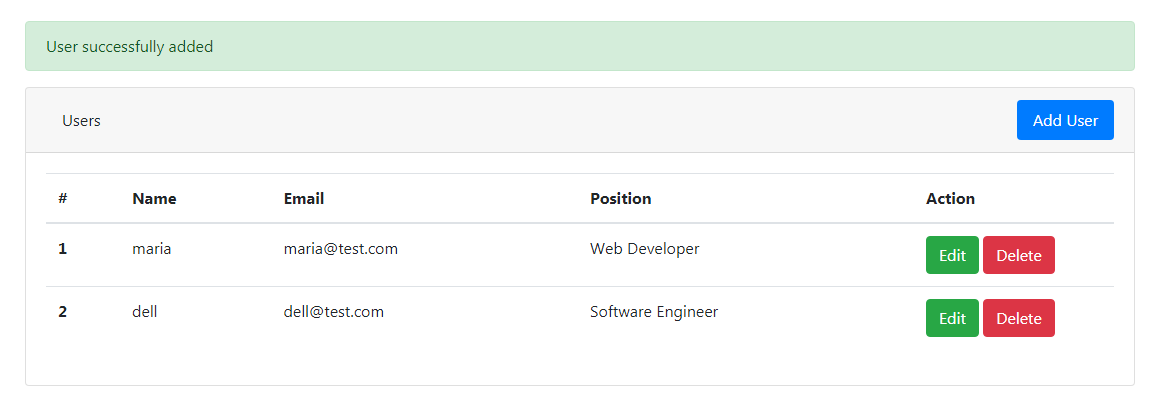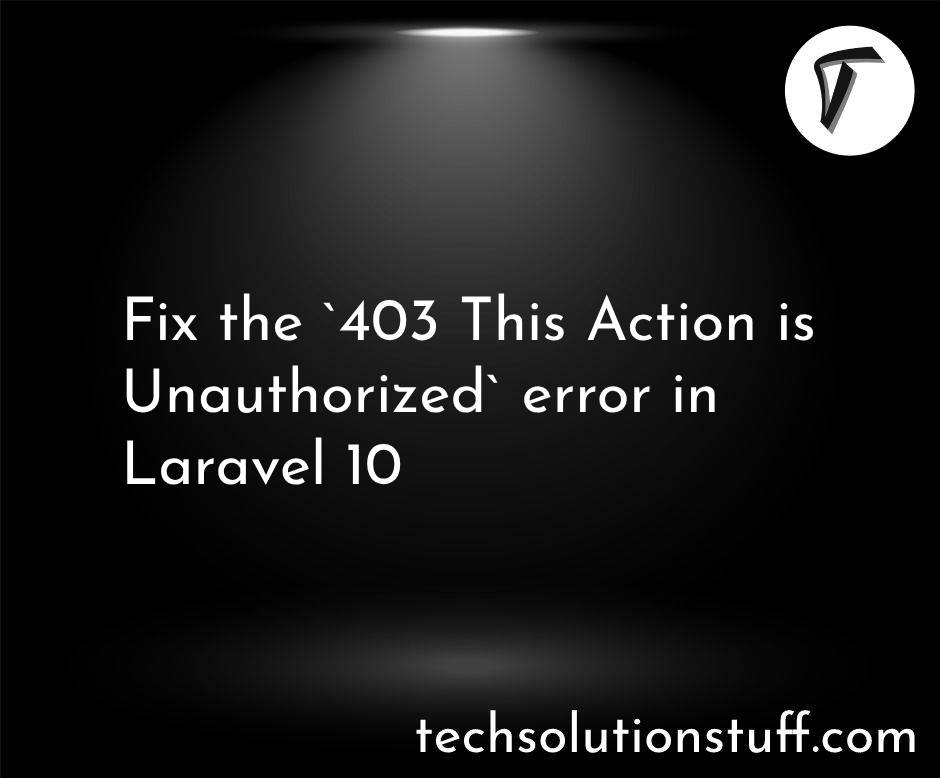Node.js Express CRUD Example With MySQL
In this article, we will perform a node js express CRUD example with MySQL. Node js Express framework with MySQL Database in we will give you step by step CRUD operation example in node js. In this example, we will use express js and MySQL modules for CRUD operation.
So, let's see the CRUD example in node js, CRUD operation in node js with MySQL, CRUD operation in express js, express js CRUD operations with MySQL, CRUD operation in node js, CRUD operation in node js using express MySQL.
Step 1: Create Node js Application for Node js CRUD example
Step 2: Install Prerequisite for node js
Step 3: Create Database, Table, and Connection for node js CRUD example with MySQL
Step 4: Create CRUD Routes
Step 5: Crete View Files for CRUD example in node.js
Step 6: Run the index.js file
Node.js is an open-source, cross-platform runtime environment for developing server-side and networking applications. You should have a basic understanding of node js.
Express.js is one of the most trending web frameworks for node.js. It is built on top of the node.js http module and adds support for routing, middleware, view system, etc.
MySQL is an open-source relational database management system that can operate on various platforms. It is easy to manage.
In this step, we will create a node.js application using the below commands.
mkdir node_js_crud_operation
cd node_js_crud_operation
npm init
In this step, we will install ejs using the below command :
npm install ejs
Now, install express js using the below command.
$ npm install express --save
Next, we need to install some dependencies. So, copy the below command and paste it into your terminal
# flash message:
npm install express-flash --save
# session like PHP:
npm install express-session --save
# to send PUT and DELETE requests:
npm install method-override --save
# driver to connect Node.js with MySQL:
npm install mysql --save
Now, create a database and create a user's table.
CREATE TABLE `users` (
`id` int(50) NOT NULL,
`name` varchar(100) DEFAULT NULL,
`email` varchar(100) DEFAULT NULL,
`position` varchar(100) DEFAULT NULL
) ENGINE=InnoDB DEFAULT CHARSET=utf8mb4;
ALTER TABLE `users`
ADD PRIMARY KEY (`id`);
ALTER TABLE `users`
MODIFY `id` int(50) NOT NULL AUTO_INCREMENT;
COMMIT;
After creating the table and database. we are connecting the database and application. In the project directory, make a folder called 'lib'. In the lib folder, make a file named 'db.js'.
path: lib/db.js
var mysql = require('mysql');
var connection = mysql.createConnection({
host:'localhost',
user:'root',
password:'',
database:'node_js_crud'
});
connection.connect(function(error){
if(!!error) {
console.log(error);
} else {
console.log('Database Connected Successfully..!!');
}
});
module.exports = connection;
In this step, we will create the routes folder. In the routes folder, creates a users.js file and add the below code.
var express = require('express');
var router = express.Router();
var dbConn = require('../lib/db');
// display user page
router.get('/', function(req, res, next) {
dbConn.query('SELECT * FROM users ORDER BY id desc',function(err,rows) {
if(err) {
req.flash('error', err);
// render to views/users/index.ejs
res.render('users',{data:''});
} else {
// render to views/users/index.ejs
res.render('users',{data:rows});
}
});
});
// display add user page
router.get('/add', function(req, res, next) {
// render to add.ejs
res.render('users/add', {
name: '',
email: '',
position:''
})
})
// add a new user
router.post('/add', function(req, res, next) {
let name = req.body.name;
let email = req.body.email;
let position = req.body.position;
let errors = false;
if(name.length === 0 || email.length === 0 || position === 0) {
errors = true;
// set flash message
req.flash('error', "Please enter name and email and position");
// render to add.ejs with flash message
res.render('users/add', {
name: name,
email: email,
position:position
})
}
// if no error
if(!errors) {
var form_data = {
name: name,
email: email,
position:position
}
// insert query
dbConn.query('INSERT INTO users SET ?', form_data, function(err, result) {
//if(err) throw err
if (err) {
req.flash('error', err)
// render to add.ejs
res.render('users/add', {
name: form_data.name,
email: form_data.email,
position:form_data.position
})
} else {
req.flash('success', 'User successfully added');
res.redirect('/users');
}
})
}
})
// display edit user page
router.get('/edit/(:id)', function(req, res, next) {
let id = req.params.id;
dbConn.query('SELECT * FROM users WHERE id = ' + id, function(err, rows, fields) {
if(err) throw err
// if user not found
if (rows.length <= 0) {
req.flash('error', 'User not found with id = ' + id)
res.redirect('/users')
}
// if user found
else {
// render to edit.ejs
res.render('users/edit', {
title: 'Edit User',
id: rows[0].id,
name: rows[0].name,
email: rows[0].email,
position: rows[0].position
})
}
})
})
// update user data
router.post('/update/:id', function(req, res, next) {
let id = req.params.id;
let name = req.body.name;
let email = req.body.email;
let position = req.body.position;
let errors = false;
if(name.length === 0 || email.length === 0 || position.length === 0) {
errors = true;
// set flash message
req.flash('error', "Please enter name and email and position");
// render to add.ejs with flash message
res.render('users/edit', {
id: req.params.id,
name: name,
email: email,
position:position
})
}
// if no error
if( !errors ) {
var form_data = {
name: name,
email: email,
position:position
}
// update query
dbConn.query('UPDATE users SET ? WHERE id = ' + id, form_data, function(err, result) {
//if(err) throw err
if (err) {
// set flash message
req.flash('error', err)
// render to edit.ejs
res.render('users/edit', {
id: req.params.id,
name: form_data.name,
email: form_data.email,
position: form_data.position
})
} else {
req.flash('success', 'User successfully updated');
res.redirect('/users');
}
})
}
})
// delete user
router.get('/delete/(:id)', function(req, res, next) {
let id = req.params.id;
dbConn.query('DELETE FROM users WHERE id = ' + id, function(err, result) {
//if(err) throw err
if (err) {
// set flash message
req.flash('error', err)
// redirect to user page
res.redirect('/users')
} else {
// set flash message
req.flash('success', 'User successfully deleted! ID = ' + id)
// redirect to user page
res.redirect('/users')
}
})
})
module.exports = router;
Now, We need to create view files for add, edit, and view. We've set EJS for templating. Go to the views folder & create a folder called users. Under the user's folder, make files named index.ejs, add.ejs and edit.ejs.
users/index.ejs
<html lang="en">
<head>
<meta charset="utf-8">
<meta name="viewport" content="width=device-width, initial-scale=1, shrink-to-fit=no">
<title>Users</title>
<link rel="stylesheet" href="https://maxcdn.bootstrapcdn.com/bootstrap/4.0.0/css/bootstrap.min.css">
</head>
<body class="container" style="margin-top: 50px;">
<% if (messages.success) { %>
<div class="alert alert-success" role="alert"><%- messages.success %></div>
<% } %>
<% if (messages.error) { %>
<div class="alert alert-danger" role="alert"><%- messages.error %></div>
<% } %>
<div class="card">
<div class="card-header">
<ul class="nav nav-pills w-100">
<li class="nav-pill active">
<a class="nav-link">Users</a>
</li>
<li class="nav-pill ml-auto">
<a class="nav-link active" href="/users/add">Add User</a>
</li>
</ul>
</div>
<div class="card-body">
<% if(data.length) { %>
<table class="table">
<thead>
<tr>
<th scope="col">#</th>
<th scope="col">Name</th>
<th scope="col">Email</th>
<th scope="col">Position</th>
<th width="200px">Action</th>
</tr>
</thead>
<tbody>
<% for(var i = 0; i< data.length; i++) { %>
<tr>
<th scope="row"><%= (i+1) %></th>
<td><%= data[i].name%></td>
<td><%= data[i].email%></td>
<td><%= data[i].position%></td>
<td>
<a class="btn btn-success edit" href="../users/edit/<%=data[i].id%>">Edit</a>
<a class="btn btn-danger delete" onclick="return alert('Are you sure want to delete this record?')" href="../users/delete/<%=data[i].id%>">Delete</a>
</td>
</tr>
<% } %>
</tbody>
</table>
<% } %>
<!-- if result is empty -->
<% if(!data.length) { %>
<p class="text-center">No users found!</p>
<% } %>
</div>
</div>
</body>
</html>
users/add.ejs
<html lang="en">
<head>
<meta charset="utf-8">
<meta name="viewport" content="width=device-width, initial-scale=1, shrink-to-fit=no">
<title>Add User</title>
<link rel="stylesheet" href="https://maxcdn.bootstrapcdn.com/bootstrap/4.0.0/css/bootstrap.min.css">
</head>
<body class="container" style="margin-top: 50px;">
<% if (messages.error) { %>
<div class="alert alert-danger" role="alert"><%- messages.error %></div>
<% } %>
<div class="card">
<div class="card-header">
Add Users
</div>
<div class="card-body">
<form action="/users/add" method="post">
<div class="form-group">
<label>Name:</label>
<input type="text" class="form-control" name="name" value="<%= name %>" autocomplete="off">
</div>
<div class="form-group">
<label>Email:</label>
<input type="text" class="form-control" name="email" value="<%= email %>" autocomplete="off">
</div>
<div class="form-group">
<label>Position:</label>
<input type="text" class="form-control" name="position" value="<%= position %>" autocomplete="off">
</div>
<div class="form-group">
<input type="submit" class="btn btn-info" value="Add"/>
</div>
</form>
</div>
</div>
</body>
</html>
users/edit.ejs
<html lang="en">
<head>
<meta charset="utf-8">
<meta name="viewport" content="width=device-width, initial-scale=1, shrink-to-fit=no">
<title>Edit User</title>
<link rel="stylesheet" href="https://maxcdn.bootstrapcdn.com/bootstrap/4.0.0/css/bootstrap.min.css">
</head>
<body class="container" style="margin-top: 50px;">
<% if (messages.error) { %>
<div class="alert alert-danger" role="alert"><%- messages.error %></div>
<% } %>
<div class="card">
<div class="card-header">
Edit User
</div>
<div class="card-body">
<form action="/users/update/<%= id %>" method="post">
<div class="form-group">
<label>Name:</label>
<input type="text" class="form-control" name="name" value="<%= name %>" autocomplete="off">
</div>
<div class="form-group">
<label>Email:</label>
<input type="text" class="form-control" name="email" value="<%= email %>" autocomplete="off">
</div>
<div class="form-group">
<label>Position:</label>
<input type="text" class="form-control" name="position" value="<%= position %>" autocomplete="off">
</div>
<div class="form-group">
<input type="submit" class="btn btn-info" value="Update"/>
</div>
</form>
</div>
</div>
</body>
</html>
In this step, import all dependencies like express js, flash message, MySQL drivers, etc.
var createError = require('http-errors');
var express = require('express');
var path = require('path');
var flash = require('express-flash');
var session = require('express-session');
var mysql = require('mysql');
var connection = require('./lib/db');
var usersRouter = require('./routes/users');
var app = express();
// view engine setup
app.set('views', path.join(__dirname, 'views'));
app.set('view engine', 'ejs');
app.use(express.json());
app.use(express.urlencoded({ extended: false }));
app.use(express.static(path.join(__dirname, 'public')));
app.use(session({
cookie: { maxAge: 60000 },
store: new session.MemoryStore,
saveUninitialized: true,
resave: 'true',
secret: 'secret'
}))
app.use(flash());
app.use('/users', usersRouter);
// catch 404 and forward to error handler
app.use(function(req, res, next) {
next(createError(404));
});
app.listen(3000);
Now, run index.js using the below code
node index.js
In your browser open the below URL.
After running this command you will get an output like the below screenshot.

You might also like:
- Read Also: How To Send Email using Node.js
- Read Also: How To Use Sweetalert2 In Laravel
- Read Also: Load More Data in Laravel Using Ajax jQuery
- Read Also: How To Use JSON Data Field In MySQL Database








